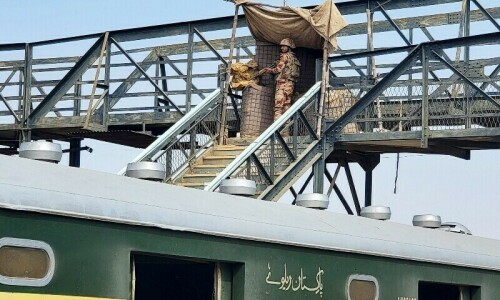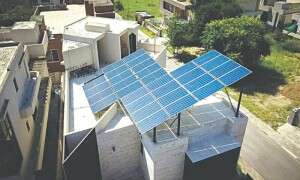The Pakistan Stock Exchange lost over 300 points on Tuesday despite the International Monetary Fund’s (IMF) approval of the release of a $1.1 billion loan tranche late last night.
The benchmark KSE-100 index opened the day on a high note, gaining 547.93 points around 9:30am. Since then, however, the index began sliding, eventually reversing all its gains from earlier in the day and slipping into the red.
It closed at 42,195.25 points, down 309.09 points or 0.73 per cent. The index saw an intraday low of 42,106.02 points around 3:30pm.
While commenting on the stock market’s early morning rise, Raza Jafri, head of research at Intermarket Securities, said the KSE-100 index continued its strong recovery from intraday lows yesterday and “cheered up” on the IMF programme’s resumption.
“Some profit-taking may come through as the IMF programme isn’t a surprise, but the overall sense is one of optimism particularly as valuations are very cheap,” he added.
Later, Arif Habib Corporation Director Ahsan Mehanti said even though the stock market gained more than 500 points in early trade, it “disregarded” the IMF-related development as the day progressed, due to which investors booked profits at the upper levels.
“The damage caused to crops by the floods means that we will have to import wheat and cotton worth billions of dollars which will widen the trade deficit and increase inflation.”
Mehanti said that the market was also dragged down by rumours of an impending interest rate hike.
First National Equities Limited Chief Executive Ali Malik said the stock market had already rallied earlier on expectations of the IMF’s approval. The market was now analysing the flood’s effect on local production and trade, he added.
“The damage caused by the floods cannot be calculated yet [but it] is widespread. Inflation in Pakistan will rise very high because crops have been wasted and livestock killed. We will have to become a net importer of these, so foreign exchange will be involved. Secondly, our exports will be reduced and local consumption will rise.”
The commodities sector, including steel and cement, will rally because local consumption will increase, Malik said.
A day earlier, the IMF’s Executive Board completed the combined 7th and 8th reviews of a loan facility for Pakistan, allowing immediate disbursement of $1.1bn to the country, said an official IMF announcement.
The statement pointed out that the disbursement “brings total purchases (money made available) for budget support under this arrangement to about $3.9bn.”
The board also approved “rephasing and augmentation” of Pakistan’s access to the funds by SDR720 million ($934m) which will bring the total access under the EFF to about $6.5bn.
The executive board also approved Pakistani authorities’ request for waivers of nonobservance of performance criteria.


















































